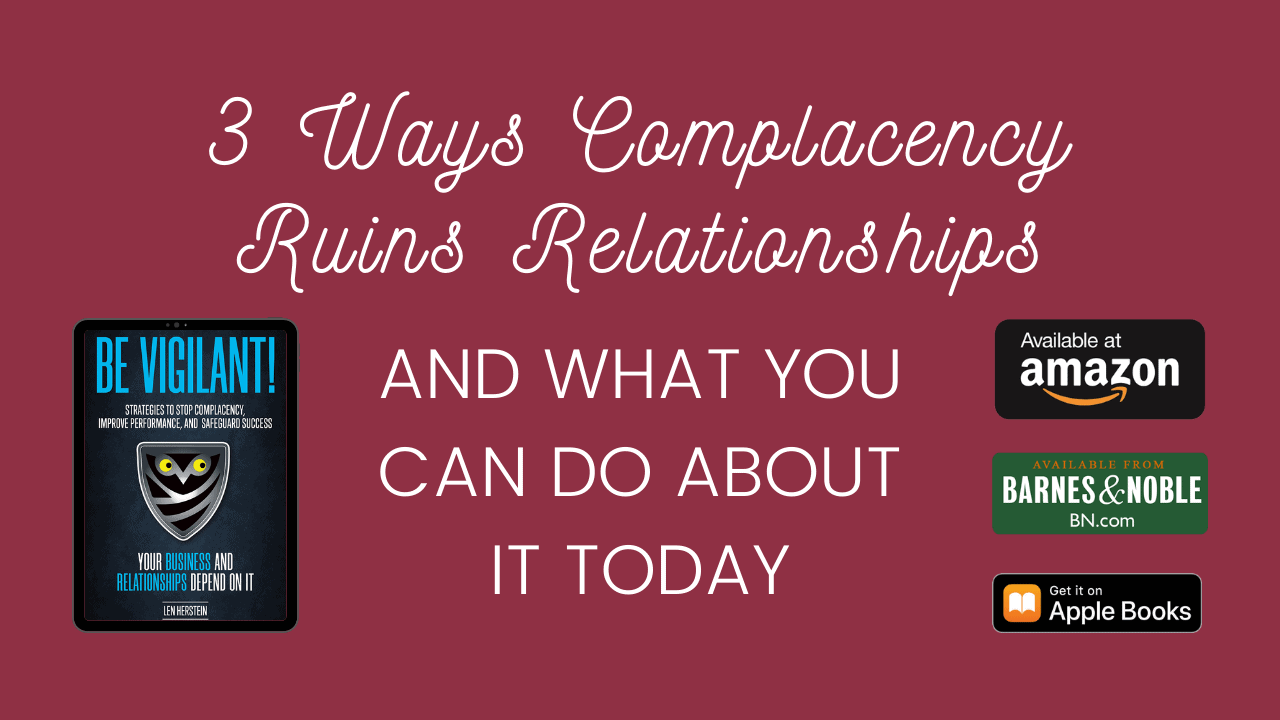(Note: Valentine’s Day is the last day to get the Be Vigilant! Kindle version for just 99 cents! )
As we celebrate Valentine’s Day, here’s a fact to consider – most failed relationships (whether personal or professional) can be traced back to some level of complacency. We experience success, we get comfortable, we get over-confident, we take things for granted, we spend more time and energy on newer, shinier things and, before we know it, once-strong relationships have suffered – sometimes beyond repair. Again, this applies as much to your relationships with your customers, employees, vendors, and business partners as it does your partner in life.
There are many lessons you’ll learn from Be Vigilant! Strategies to Stop Complacency, Improve Performance, and Safeguard Success that apply directly to your relationships. Here are just three:
1. Threat Awareness. The more comfortable we become in relationships, the more unaware we become of where the potential threats lie. We must work together with our partners to actively identify potential threats (examples: trust, mental health, money, etc) so that we can address them and plan for them proactively. The worst time to figure out what we’re going to do when a relationship experiences a crisis is when we’re already in the crisis! In Be Vigilant! you’ll learn some simple strategies for keeping your threats in front of you.
2. Get Off the X and Remain Strategically Unpredictable. It’s undeniable that a certain level of predictability is necessary for a strong relationship. It helps us feel safe and allows us to build trust. It’s also undeniable that too much predictability breeds complacency, makes us blind to potential dangers, and is just plain boring. Boring kills relationships (and so does complacency). In Be Vigilant! you’ll learn the OODA Loop decision making process and how you can use it to build strategic unpredictability into your relationships.
3. Debrief, Debrief, Debrief. Most people will say they conduct debriefs in their organizations right now. The reality, though, is that most of these are done when THINGS GO WRONG. And they’re most often focused on figuring out what went wrong and placing blame accordingly. Most organizations very rarely debrief when THINGS GO RIGHT. It’s even rarer in personal relationships. This is why we’re so susceptible to complacency when we’re experiencing success. During periods of success, we don’t spend time or energy being introspective. We back-pat instead of looking at what really happened. What went right but could have gone right-er? What went right by accident? Was something successful because of outside factors more than our own actions? Without spending the time debriefing success we’re destined to miss the red flags, the tiny micro-failures that add up in the long-run, our areas of vulnerability. Because they’re cloaked, hidden in positive results. Until they aren’t. In Be Vigilant! you’ll learn the eight elements of successful debriefs (the first, and most important, of which, is that they need to be done regularly and REGARDLESS OF EVENT OUTCOME) so that you can build them into your relationships to safeguard your success.
These are just three ways we can protect our relationships, both at work and at home, from the dangers of complacency. You can learn much more about these three, as well as many other strategies you can begin to implement today, in Be Vigilant!
And there’s no better time to get Be Vigilant! than today – the last day you can get the Kindle version for just 99 cents!
Happy Valentine’s Day! And Be Vigilant!
Len


0 Comments